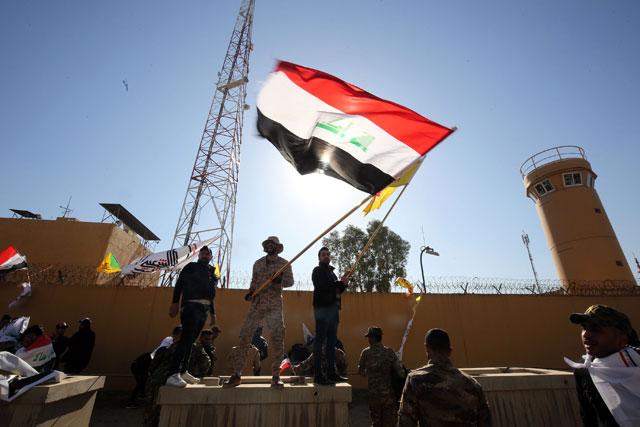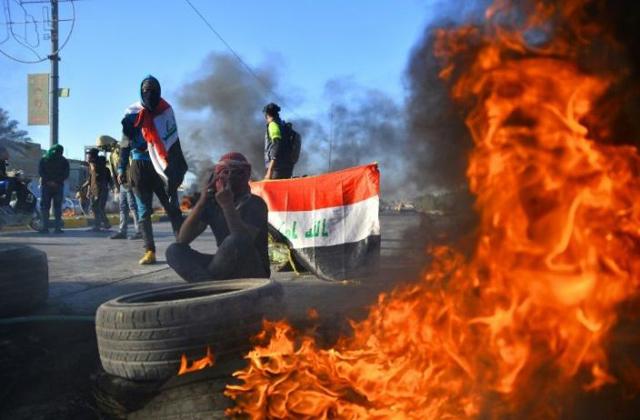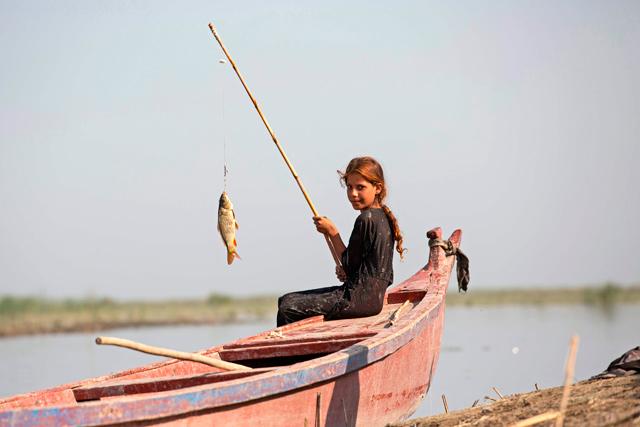You are here
Pro-Iran protesters attack US embassy over deadly Iraq strikes
By AFP - Dec 31,2019 - Last updated at Dec 31,2019

An Iraqi protester waves a national flag in front of the outer wall of the US embassy in Baghdad's Green Zone during an angry demonstration on Tuesday to denounce weekend US air strikes that killed Iran-backed fighters in Iraq (AFP photo)
BAGHDAD/WASHINGTON — Iraqi supporters of pro-Iran factions attacked the US embassy in Baghdad on Tuesday, breaching its outer wall and chanting "Death to America!" in anger over weekend air strikes that killed two dozen fighters.
It was the first time in years protesters have been able to reach the US embassy, which is sheltered behind a series of checkpoints in the high-security Green Zone.
A stream of men in military fatigues, as well as some women, marched through those checkpoints to the embassy walls with no apparent reaction from Iraqi security forces.
Meanwhile, President Donald Trump said on Tuesday he expects Iraq to “use its forces” to protect the US embassy in Baghdad as he blamed Iran for orchestrating an “attack” that breached the wall of the compound.
“We expect Iraq to use its forces to protect the embassy, and so notified!” Trump tweeted, saying Iran “will be held fully responsible” for the unrest.
In his tweet, Trump said the US had “strongly responded” to the attack that killed the US contractor, and “always will”.
The State Department said Secretary of State Mike Pompeo had delivered a similar message on Tuesday in separate phone calls with Iraq’s acting prime minister Adel Abdel Mahdi and President Barham Saleh.
Both Iraqi leaders assured Pompeo “that they took seriously their responsibility for and would guarantee the safety and security of US personnel and property”, the department said.
Pompeo “made clear the United States will protect and defend its people, who are there to support a sovereign and independent Iraq, it said.
The demonstrators waved flags in support of the Hashed Al Shaabi, a mostly Shiite network of Iraqi armed groups that has received training and weapons from powerful neighbour Iran.
They threw rocks and wrenched security cameras off the walls, ignoring calls over megaphones to leave the embassy compound.
In response, US marine guards fired an initial volley of bullets, then switched to tear gas and flash bangs to disperse the crowd.
The Hashed said at least 20 people were wounded.
Caretaker prime minister Adel Abdel Mahdi said that the crowds that had stormed the US embassy should leave the compound “immediately”.
“We recall that any aggression or harassment of foreign embassies will be firmly prohibited by the security forces,” Abdel Mahdi’s office said several hours after the attack began.
The Iraqi government had earlier announced three days of mourning for the 25 fighters killed in the US strikes.
The demonstrators were protesting US air strikes that killed at least 25 fighters from a hardline Hashed faction known as Kataeb Hizbollah (Hizbollah Brigades) on Sunday.
Those strikes were in response to a 36-rocket attack last week that killed one US contractor at an Iraqi base, the latest in a string of attacks on areas where US troops are deployed.
They have not been claimed but US security assessments have largely blamed them on Kataeb Hizbollah.
The United States has around 5,200 troops deployed across Iraq to train security forces and prevent any resurgence of the Daesh terror group.
‘Soleimani is my commander’
After the strikes, Kataeb Hizbollah and other pro-Iran factions in the Hashed demanded the “withdrawal of the American enemy”.
Protesters echoed those calls on Tuesday, carrying posters reading: “Parliament should oust US troops, or else we will.”
Others carried banners with US President Donald Trump’s face crossed out.
They scrawled “No to America!” and “Soleimani is my commander” on the embassy walls, referring to Iran’s pointman for Iraq, Revolutionary Guards commander Major General Qasem Soleimani.
Many set up tents to begin an indefinite sit-in.
The US ambassador Matthew Tueller has been outside Iraq for two weeks on holiday, a diplomatic source told AFP.
The source denied other staff had been evacuated.
Among those at the protests were Iraq’s National Security Adviser Faleh Al Fayyadh — who is also the head of the Hashed — and other top Hashed officials.
Iraq had long feared being caught in the middle of escalating tensions between its two main allies the United States and Iran, after Washington pulled out of a landmark nuclear deal with Tehran last year.
‘Low point of US policy’
Since the weekend strikes, ties have been increasingly strained.
Iraq’s government, acting in a caretaker capacity after Abdel Mahdi resigned in the face of street protests, threatened to summon the US ambassador.
“American forces acted on their political priorities, not those of Iraqis,” it said.
Dozens of lawmakers called on the government to review an agreement allowing the deployment of US soldiers in the country, saying the strikes amount to a violation of sovereignty that renders the pact obsolete.
The United States, meanwhile, accused Iraq of failing to “protect” US interests in the country.
US defence officials have told AFP that pro-Iran factions now pose a greater threat than IS because of the repeated rocket attacks.
Abdel Mahdi said he had been forewarned by Defence Secretary Mark Esper that the US would carry out the strikes.
“He told me the United States would strike the Hizbollah Brigades and I told him it would be a very dangerous act that could lead to an escalation,” Abdel Mahdi said.
The premier tendered his resignation in November after two months of anti-government rallies.
“This may well be the low point of US policy in Iraq,” said Iraq expert Fanar Haddad of Singapore University’s Middle East Institute.
“That the national security adviser, MPs, a former minister and head of one of the most powerful parliamentary blocs are involved speaks volumes about the failure of US policy and the nature of the Iraqi state they helped create,” Haddad said.
Related Articles
BAGHDAD — Iraqi security forces were Friday interrogating pro-Iran fighters detained for planning a rocket attack in the first such raid in
DIWANIYAH, Iraq — Iraqi protesters flooded the streets on Sunday to denounce both Iran and the US as "occupiers", angry that fears of war be
BAGHDAD — Enraged by near-daily attacks on its interests in Iraq, Washington has threatened to close its embassy in Baghdad, in a blow to a


















